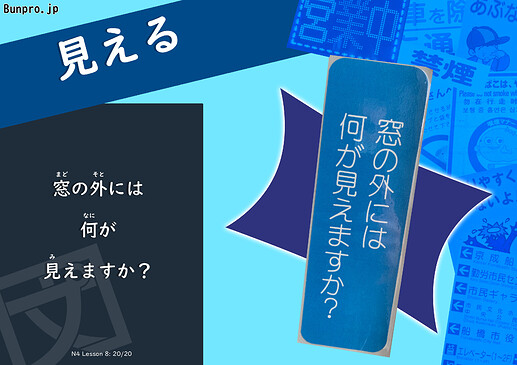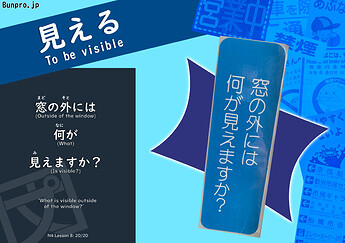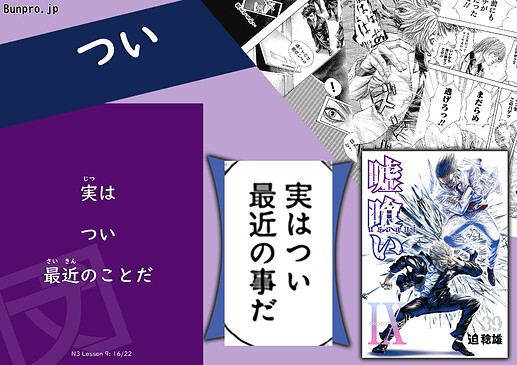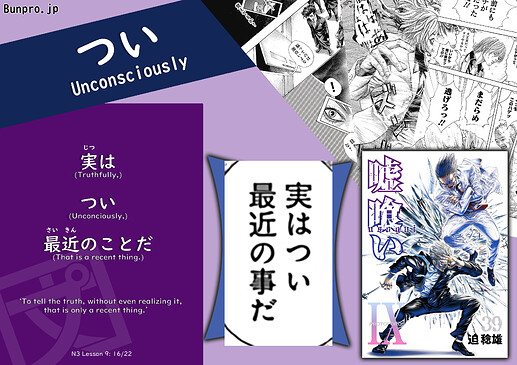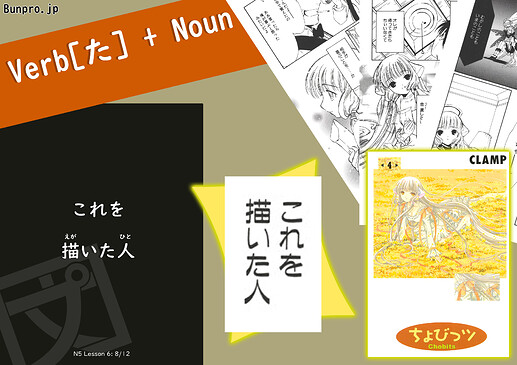August 4th
...
What do you see outside of your window?
Summary
What is visible outside the window?
メガネなしで全然見えない。
から use
「進撃の巨人」を見始めたけど面白くなくて普通なアニメのように思われたので諦めました。でも後で友達から見続ける勧めを受けてくれました。そうしました。本当に話は進めば進むほど面白くなります。
I started watching “Attack on Titan” but since it wasn’t interesting and I thought it seemed like an average anime I dropped it. But after that I received a recommendation to continue watching it from my friends. So I did that. The story really became interesting the more that I watched.
At first I saw the kanji and felt like

but that was actually really nice.
Summary
What can be seen outside of the window?
Pollen, mosquito bites, and a trail of sweat leading to the mailbox. What was this sign being used for? I could only think of something super niche like an exhibit.
みえる use
I’m going to pass on writing my own again.
メガネなしで全然見えない。
I can’t see at all without glasses. 
Summary
何が, therefore literally “what can be seen” but a more natural translation would be ‘what can you see outside your window?’
Tentative Translation
What can you see outside the window?
translation
What can you see out of the window?
use case
町の光は田舎で薄いので夜の空は暗くて天の川がよく見えます。素晴らしいですね。
bunpro guy's use case translation
メガネなしで全然見えない。
Without my glasses I can’t see anything.
For this one bunpocheck finds an error (at で全) but I can’t see why. Any idea someone?
August 4th Translation
Notes: While 見える used to be a conjugation of 見る, it has come to be used as it’s own stand alone word these days with it’s own conjugations. As it is referring to the thing itself, and not the speakers ability to see that thing, it is closest to ‘to be visible’ in English. Hence why this verb is regularly used for things that are visible, regardless of whether you are looking at them or not. 見える is only rarely used when ‘searching’, or some special ability is required to ‘see’ the object.
...
That last one wasn’t on purpose, to be honest.
Edit: whoops, failed this one. I’ve searched it and it looks like 実はつい最近 is kinda set phrase that means something like “Actually, quite recently”, “It only happened recently”. 実はつい and つい最近 are quite common on its own too.
I just checked with a native, they said it’s correct. I’ve found the bunpocheck spotty when I first tried it, feeding it known incorrect grammar and not flagging. But maybe it means no one on twitter has said it? IDK
Tricky BunPro, this comes up all the time in grammar topics (and useful too)
Summary
In reality, against my better judgement, it’s a recent thing.
本当に今朝仕事が忙しすぎるけど、つい夜通しに友達とし飲んだり喋りたりしてちゃった。
Sorry Fred! I didn’t see this comment! Yep, a very veryyyy casual ましょう. @distantflower was quite close, it almost does seem like passive aggression.
“At the time of me respectfully speaking to you, could you wear a mask?”. Like saying ‘I am respecting you by doing (A), so why don’t you do me the common courtesy of doing (B).’
Because this does sound a little bit passive aggressive, that’s where the ‘we’ comes in. It would be strange to make such a request unless the speaker was willing to do the same thing to show mutual respect.
Summary
Interpretation: The truth is, it’s a recent thing I started doing accidentally/unconsciously.
The 実は makes me think the speaker is correcting someone, like “it looks like I’ve always done this, but it’s something I started doing recently”. And the つい sounds like “I didn’t mean to start it”.
Really struggling for this one… 
Tentative translation
As for the truth, it is accidentally close to it.
translation
Actually this is accidentally a new thing.
This does not seem to make sense…
use case
アイスクリームが大好きですから体に悪いと知っているのに、ついたくさん食べてしまいます。
bunpro guys' use case translation
本当に今朝仕事が忙しすぎるけど、つい夜通に友達とし飲んだり喋りたりしてちゃった。
This morning I am really busy at work but against my better judgement in the evening I ended drinking and chatting with friends.
Thanks for checking @s1212z . Yes sometimes bunpocheck seems biased toward often-used version of sentences. At some point it didn’t accept 綺麗です but きれいです was ok. According to one of my teacher it was probably because people don’t often use this word in kanji.
Summary
Looks great. Sorry, I had a typo that I just fixed which may have misled a bit. I misspelled 夜通し which is supposed to imply “through the night” to stay up really late in this context.
I love ice cream, though I know it is bad for me (and against my better judgement), I’m eating a lot *of it). 

August 5th Translation
Notes: つい can have many meanings when translated into English, and is often partnered with time words (like 最近). In these cases it usually has the meaning of something going unnoticed until a certain point.
...
[This is] the person who drew it.

